World of Warcraft: The Burning Crusade Walkthrough
It's time to venture out into the Outland. GameSpot's primer for The Burning Crusade will get you started on your journey!
Design: Randall Montanari
It's been a long two years since Blizzard unleashed World of Warcraft on a gaming world that was apparently primed to receive it. While some massively multiplayer games had done well before WoW hit store shelves in November of 2004, none had achieved anything like the unprecedented success of Warcraft. As one of the biggest smash hits in PC gaming history, whether online or off, World of Warcraft has taken on a life of its own, increasing its worldwide subscriber rolls to eight million players in the last two years.
Unfortunately for those of you who dabbled with WoW and managed to escape the addiction, Blizzard has managed to unleash another four compact discs full of captivating content in the form of The Burning Crusade, the first full expansion for World of Warcraft. The list of new additions in the Burning Crusade is a rollcall of the popular features that you might have expected: new races, new zones to quest in, a new profession, a raised level cap, and so on.
This short primer to the Burning Crusade is intended to introduce you to some of the new features of the game. The amount of new content that's been added to the game, especially in the Outlands, will be more than we can possibly cover in a short space, but if you're looking for some of the new surprises in the expansion, then feel free to read on!
Jewelcrafting
The new profession in The Burning Crusade is called jewelcrafting. If you intend to level it up, you'll want to match it with mining, as jewelcrafting uses plenty of ore and stone. If you want to switch a high-level character with mining over to jewelcrafting, then you'll have to spend plenty of time searching low-level zones for copper and tin to use to skill yourself up, or buy it on the auction house.
At low levels, jewelcrafting is primarily concerned with the construction of rings and necklaces, which few of the other professions can create. These items can be created and used by yourself, or traded to your teammates, or sold on the auction house - they aren't soulbound, nor do they require the wearer to have any skill points in jewelcrafting to wear them, as many of the engineering items do. Many of them are unique, though, so if you see a specific ring that you like and make yourself two of them, you'll probably only be able to wear one of them at a time.
A Note Of Caution
One thing you should be aware of if you're thinking about taking on Jewelcrafting as a skill for your new character is that training for this skill in Azeroth is only available in the two new capital cities, Exodar and Silvermoon. Characters that aren't Draenei or Blood Elves can still become jewelcrafters, but will have to deal with a fairly lengthy trip to one of these cities before they can pick it up.
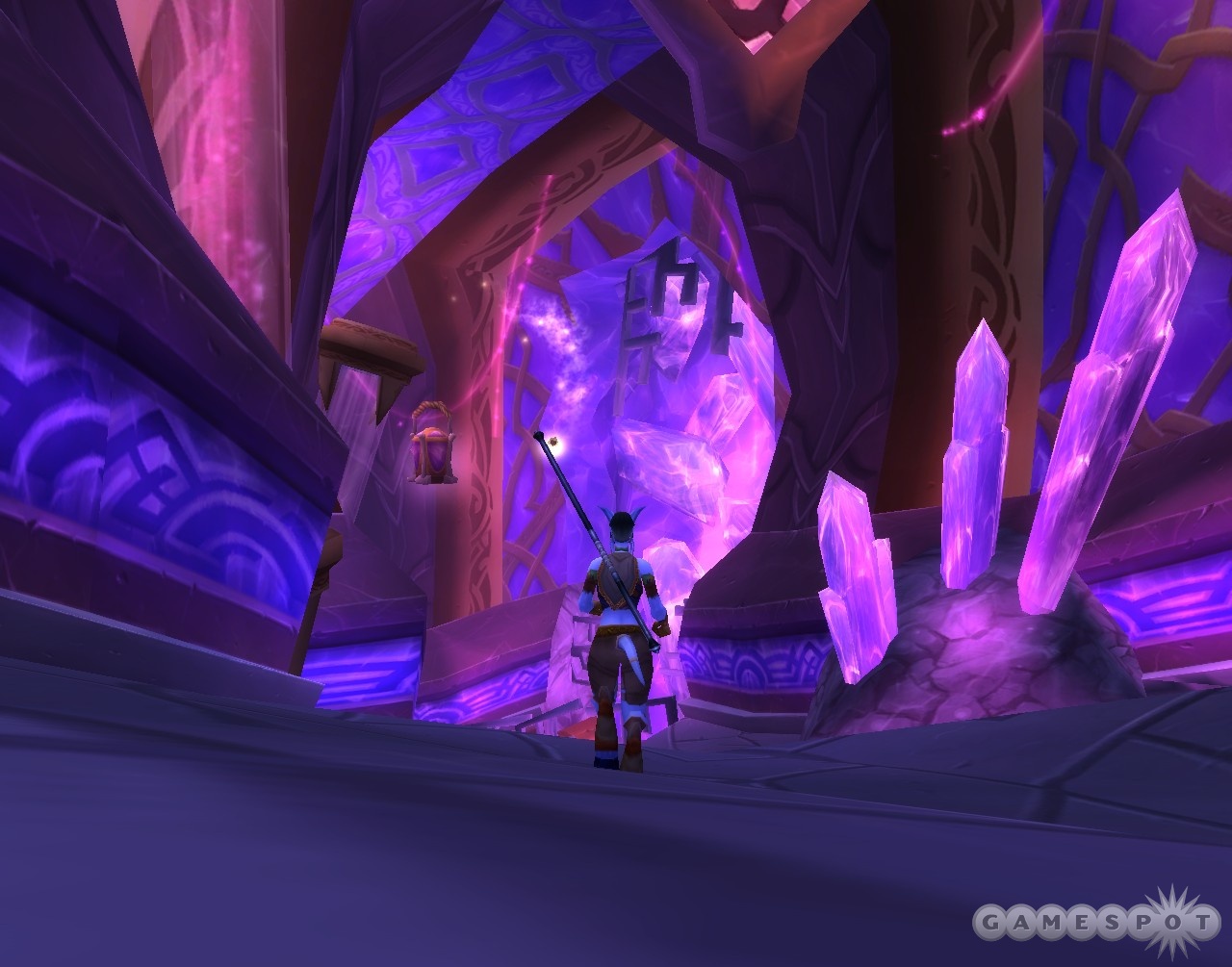
What's more, though, is that when you leave the starting areas for these races, you won't be able to learn new recipes for them unless you return. This is particularly problem for Draenei, who will probably head down to the areas around Stormwind to do the Deadmines after leaving Azuremyst Isle. If you want to head back to Exodar and train, you'll have to head to fly back to Ironforge, fly to Menethil Harbor, then take a couple of boat rides to reach Exodar. It's a heck of a hike just to train a skill, especially if you have to make it multiple times when the recipes you're using stop giving you guaranteed skill-ups. The Blood Elves have a bit of an easier time with it, since they can teleport to Silvermoon from the Undercity, but that'll still be a long hike from the Barrens or Stranglethorn Vale.
You can get Jewelcrafting training in the Outland after level 58, so at that point the problem is less severe, but it's still annoying! If you don't want to deal with a number of long trips that stall your experience-gaining, then you may simply want to use mining as you level up your character and stockpile the ore that you collect on a mule character, using skinning as your secondary profession to sell the leather and make money. If you save six or seven stacks of each type of ore and stone, you should be able to drop skinning and flip over to jewelcrafting just before you hit the Outland and get most of the way to 300 skill without having to go out collecting any more. It's a lot of work for the same result, but it will let you spend your time worrying about getting experience instead of flying back to Exodar every few levels, then it'll probably be the wisest path.
Starting Jewelcrafting
Jewelcrafting is best obtained alongside a new character, although it's obviously available to characters that have already been leveled, assuming that you have the Burning Crusade expansion released. As mentioned, you'll need to use plenty of copper, tin, and bronze to get yourself up past the first 100 skill points or so. You can buy these on the auction house, but since jewelcrafting is the only new profession in Burning Crusade, you can expect that many of these materials will be at an inflated price for a while as everyone and their brother attempts to try out the new tradeskill. Best to farm the materials yourself.
When you start creating items, you'll want to try to increase your skill in jewelcrafting by making plenty of Delicate Copper Wire and Bronze Settings. Delicate Copper Wire is the recipe that should propel you most of the way to the fiftieth skill point, which is where plenty of new recipes will be unlocked to you. When you reach character level 10, you can start creating some very basic rings for yourself. Since rings don't usually start popping up as drops or quest items until the middle or late teen levels, you'll have a bit of a head start on other characters in this category, but the bonuses from the early rings and amulets are going to be very minor, on the order of +1 or +2 to a single attribute.
The Stone Statues, which come along in Rough, Coarse, Heavy, and other stone varieties, will be another great way to level up your skill in jewelcrafting. These statues use up the supply of stones that you will be gaining from mining without drawing down the supply of metal bars or ore that you'll need for your real recipes. They're actually handy to have in combat, as well, since they'll initiate a heal over time when you drop them at your feet; if you aren't a healing class, then these should help you survive some of the tougher fights you encounter as you solo yourself up past the teen levels. They do use up a lot of stone to create, though, so you may want to check the auction house to see if you can't find any cheap auctions for stone. These statues are bind on pickup, however, so they can't be traded or auctioned.
Prospecting
When you reach skill level 20 in jewelcrafting, you can obtain the Prospecting ability from your profession trainer. (If we recall correctly, this is a modified ability of an old Mining skill from the original WoW beta that increased the chance that rare jewels would spawn when you mined.) You use Prospecting on stacks of ore in your inventory (not bars!). Using Prospecting on a stack of ore will destroy five pieces of ore and let you acquire any valuable gems from the rubble. You can expect to pick up extra malachite, tigerseye, and shadowjewels from the various kinds of ore, with lower-grade ore (copper, tin) producing lower-quality jewelstone.
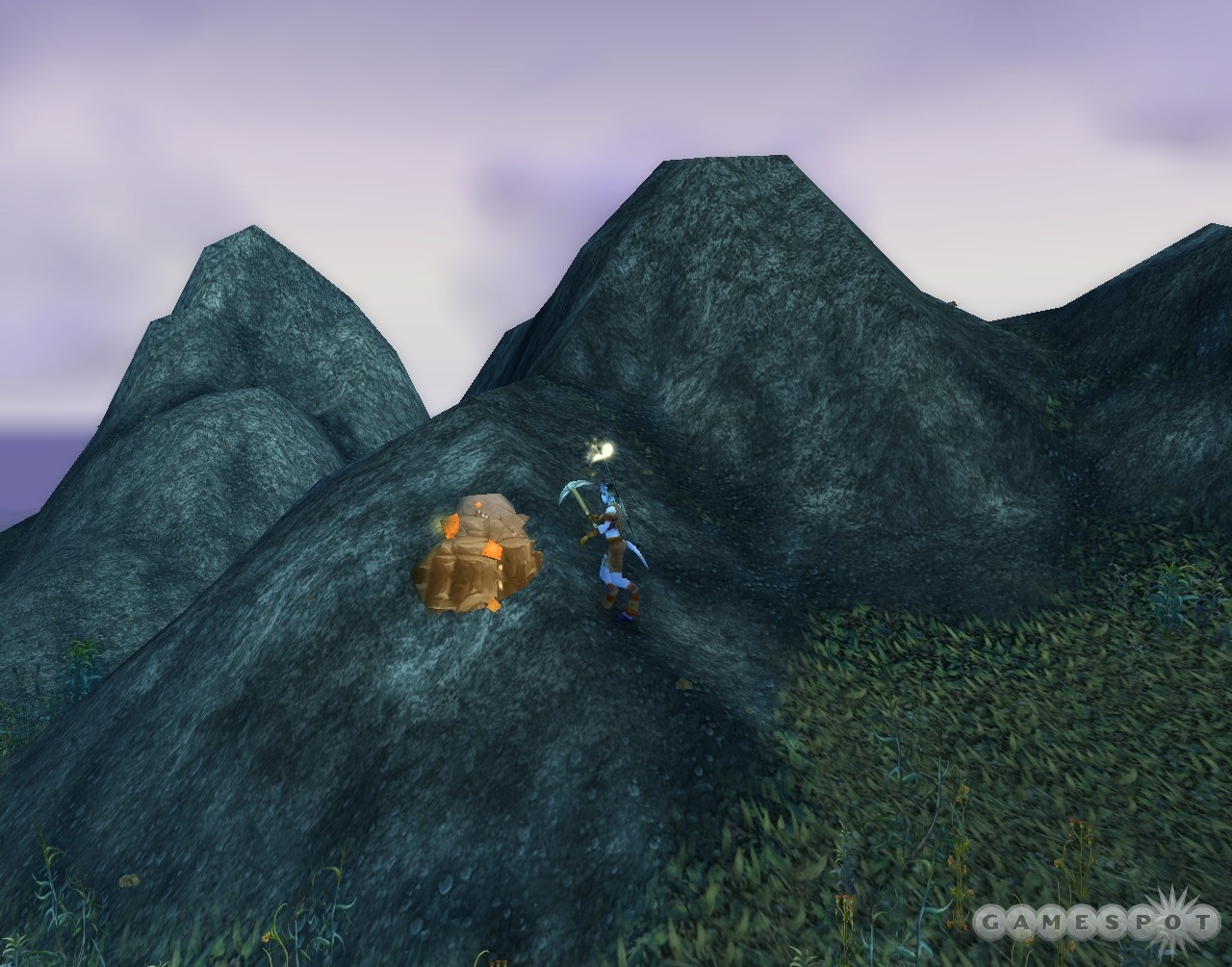
Whether or not you really want to use Prospecting is up to you and where you are in the skill progression. For example, if you just broke skill level 50 and have a bunch of different recipes that you can use to increase your skill level, then you'd probably be better off making Bronze Settings and Coarse Stone Statues for as long as you can to increase your skill. Since Prospecting destroys five ore, you have to ensure that the tradeoff is worthwhile to you. You may only get one jewel from Prospecting, so you may actually wind up gaining fewer skill points from using it than you would if you just smelted the ore and used the resulting bars in recipes, especially if you're attempting to skill up by using recipes that use very few pieces of ore, like Delicate Copper Wire and Bronze Setting.
That said, you can't guarantee what Prospecting will generate, so if you desperately need a specific kind of jewel and don't have much ore to Prospect, you may be better off attempting to track that jewel down in the auction house. It will depend on how much spare money you have, of course.
Midlevel Jewelcrafting
Like other professions, you'll probably have to create a number of useless items to increase your skill in jewelcrafting. You'll unlock some powerful recipes as you skill up, though, including a number of very useful Figurine recipes. These trinkets start becoming available around skill level 200 and become wearable around character level 35 or 40, and have some interesting uses; some will passively increase your running speed or defense skill or something similar. Many of them will also have usable triggers. For instance, the Truesilver Boar figurine will passively increase your attack power by 8 points, but can also be activated to summon the eponymous boar to fight alongside you for 30 seconds. These usable abilities are on timers, though, so you won't be able to use them over and over again. More importantly, though, these figurines are bind on pickup, so you won't be able to trade them, mail them to other characters, or auction them off. Many of them will be useless to your class (a warrior will have no need of extra spell damage, for instance), but some of them will be quite handy.
Jewelcrafting In Outlands
It's when you reach the Outlands and start finding the equipment there that jewelcrafting takes on its final use. In addition to jewelry and trinkets, jewelcrafting can also be used to make jewels that can be inserted into the armor that drops in the Outlands with slots for those jewels. Some of these jewels are exceedingly useful, especially if you aren't in a large guild and/or don't run the end-game instances very often for the powerful jewels that are dropped by those bosses.
To create polished jewels, you'll need to purchase a grinder from a jewelcrafting merchant and also find rough gems from. Rough gems are found on enemies (albeit rarely), as well as in the higher-level fel iron, khorium, and adamantite veins that you'll be mining. Most of the polished jewels that you find can be created with only a single rough gem, so these are good ways to increase your skill without using too many materials. Two of the gems required to create the high-level rare jewelstones, though, can only be created through transmutations, which are on long cooldowns for alchemist characters, and the recipes for which can only be obtained by having high reputations with some of the Outland factions. You'll probably have to pay alchemists or rely on your guildmates to create these expensive gems.
New Races
Arguably the biggest inclusion in the Burning Crusade is the inclusion of two new races, one for each faction. The Dranei are the new Alliance race, and the Blood Elves are the new Horde race. Each race has been introduced as a means to eliminate some of the factional imbalances that were inherent in the early design of the game, specifically in the fact that each faction had classes specific to it. Now that the Dranei can become shamans and the Blood Elves can become paladins, there are no faction-specific classes, which will hopefully eliminate some of the imbalances that existed in PVP in the original game. That's the hope, at any rate.
Draenei
The Draenei are the new Alliance race. These noble beings are members of the Eredar, a noble race that flourished 25,000 years before the events of the World of Warcraft. Unfortunately, most of the race was corrupted and enslaved by Sargeras, a mighty, insane god that created the Burning Legion. Some, however, escaped enslavement and managed to flee their world. Led by Velen, these group of uncorrupted Eredar have renamed themselved the Draenei, which means "exiled ones" in their tongue. Although the corrupted Eredar have chased them for millenia, the Draenei have managed to retain their society and evade destruction. The Legion struck a mighty blow against them, however, when it corrupted the Orcs of the planet Draenor and set them upon the Draenei, wiping out a large proportion of them.
In a desperate attempt to flee, Velen and the remaining Draenei hijacked a cosmic ship known as the Exodar and used it to shift through the dimensions around Draenor. They wound up above Azeroth, the world where the World of Warcraft is set, and crash landed on a island in the northwestern corner of Kalimdor, where they've begun seeking diplomatic ties with the Alliance and to aid them in their fight against the Horde.
Dranei Abilities
The Draenei are capable of creating characters in the following classes:
- Hunter
- Mage
- Paladin
- Priest
- Shaman
- Warrior
The Draenei are the only Alliance race that can become Shamans, and thus bring some fresh blood in multiple senses to the Alliance. They have a number of new abilities as well.
Jewelcutting: Adds a passive five points to a Draenei's Jewelcrafting skill. This is a fair bit less than the 15 points in Engineering that gnomes get, for instance, and won't be worth anything to Draenei who don't take the Jewelcrafting skill.
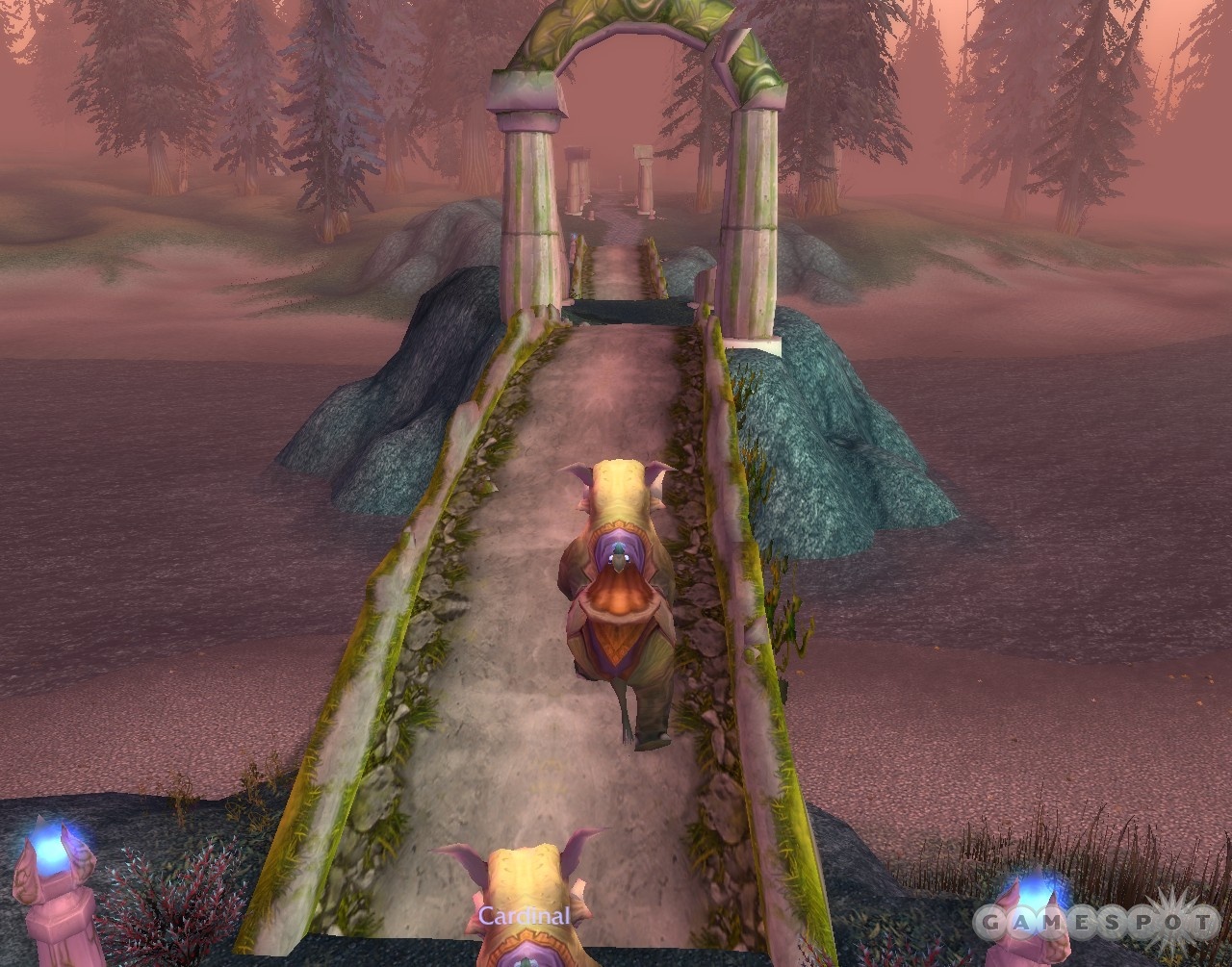
Gift of the Naaru: All Draenei characters have a built-in healing ability that acts as a somewhat weaker version of Renew. It heals the target (you can cast it on yourself) for 50 health plus 15 health per character level over 15 seconds. There is a 1.5 second casting time, but that's short enough to allow warriors and other melee characters to cast it on themselves in the middle of a one-on-one fight. This can shorten your downtime in PVE or allow you to get a second wind in a PVP fight, but there is a three minute cooldown, so it won't be useful to you in every fight. Priests and shamans will probably have better healing spells available to them, so they won't need to use this overmuch. For non-healing characters, though, this will probably come in handy, even if it probably won't replace First Aid anytime soon.
Inspiring Presence: Mages, Priests, and Shamans can all increase the chance to hit with spells by 1% for themselves and all party members nearby.
Heroic Presence: Hunters, Paladins, and Warriors can all increase the chance to hit with weapons by 1% for themselves and all party members nearby. While this (and Inspiring Presence) probably don't stack, they're still a very handy ability to have, especially when you're facing off enemies a level or two above you. They also go along nicely with Paladin auras.
Shadow Resistance: All Draenei get a 10 point bonus to their Shadow Resistance.
Draenei Starting Areas
The Draenei start in Azuremyst Isle, in the extreme northwestern corner of Kalimdor, near the starting zone for Elves. The early quests revolve around attempting to reverse the damage caused by the numerous crystals which fractured off of the Exodar as it crashed; many of them have leaked energy into the environment, corrupting the surrounding flora and fauna. As you progress through to the second island of the Draenei, Bloodmyst Isle, you'll start dealing with Blood Elf spies who have infiltrated the island and whom are attempting to draw power from the crystals themselves.
The Exodar has all of the main features that a capital city would expect: a flightpath, trainers for most classes and professions, battlemasters, and so on. Unfortunately, it, like Darnassus, is a bit remote from the other Alliance capitals of Ironforge and Stormwind, and thus will not likely be a prime destination for most players when they're strong enough to leave the islands.
If you do all or most of the quests on both islands, including the final quests involving the Vector Coil and the elite Blood Elves there, you should find yourself at or around level 18 or 19 and strong enough to travel south to Darkshore via the ship that docks south of the Exodar and do some of the quests there, if you like, or simply skip straight to Ashenvale and quest there.
On the other hand, if you want to get right to the meat of the Alliance and head straight to the Deadmines, you'll have to partake in the classic Wetlands run. Take the boat on the south side of the Auberdine docks in Darkshore to Menethil Harbor and run to the east, following the road to Loch Modan and from there through Dun Morogh and into Ironforge, where you'll be able to fly or take the tram to Stormwind. You can perform this run at any level you like if you want to join up with dwarf or human friends, but you can expect a heck of a lot of dying in the Wetlands if you head along the path there too early.
Blood Elves
The Blood Elves are technically the same race as the High Elves, both of which are descendents of the Night Elves. The High Elves, though, fight their addicition to magic, which has gone unsated since the destruction of the Sunwell, the source of most of their magical resources before the arrival of the Scourge. Following the Sunwell's destruction by Arthas and the abandonment of the city of Silvermoon by the Scourge, which had killed most of its inhabitants, the remaining High Elves in the area, led by Prince Kael'Thas, retook the city and attempted to gain vengeance for their brethren that were killed by the undead Scourge. As such, Kael'Thas has renamed his followers the Blood Elves, in memory of their slain ancestors.
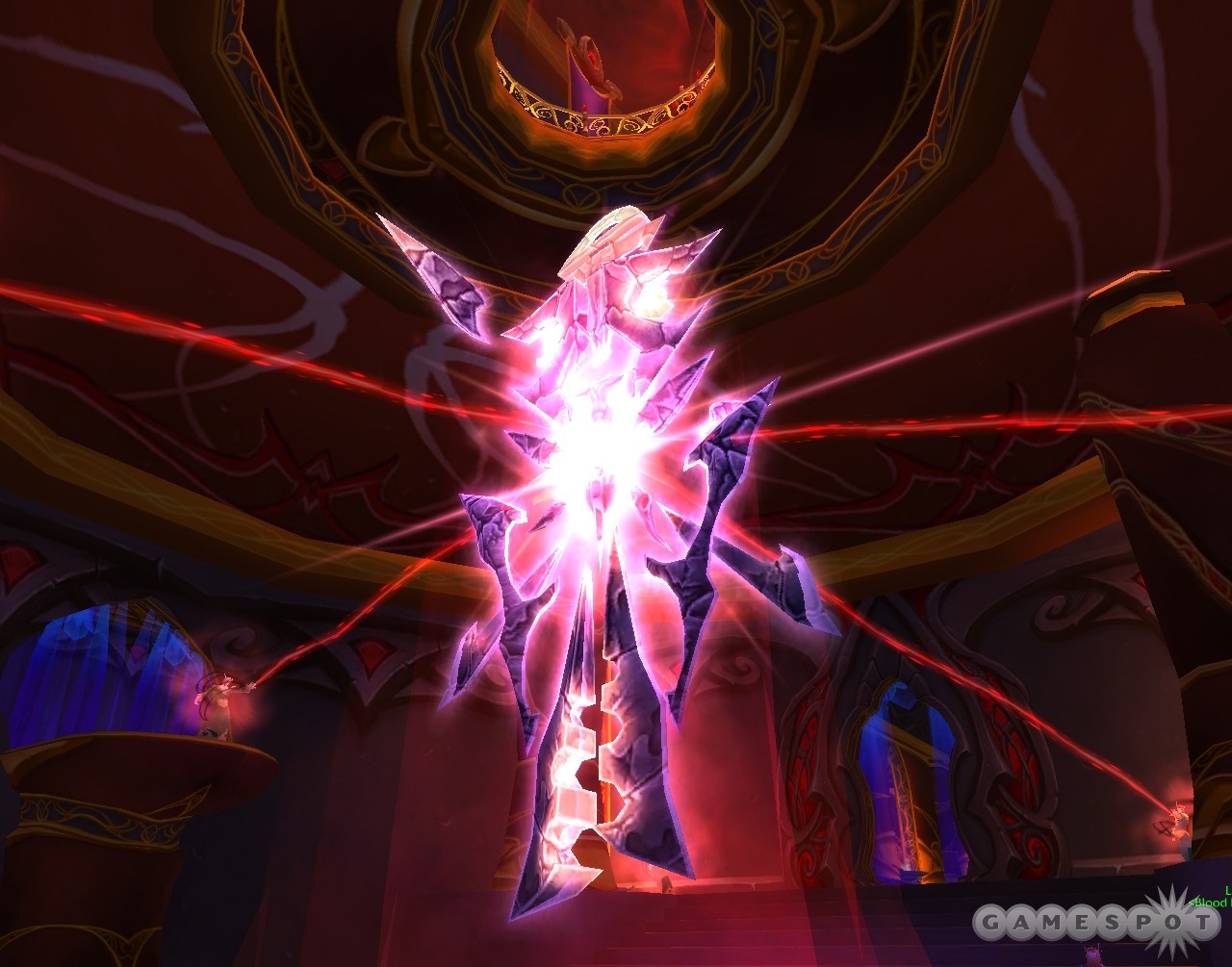
Unlike the High Elves, though, the Blood Elves are unapologetic about their addicition to magic and have relentlessly sought a replacement for the Sunwell. Kael'thas has shifted his magical addicition so that he can draw upon demonic sources to feed his thirst, and has been instructing his followers to do the same. In addition, the Blood Elves of Azeroth have managed to enslave a Naaru, a creature of almost pure Light energy, and drain its power to enable their soldiers to become Paladins in a twisted inversion of the normal religious requirements to becoming one of these holy warriors.
Since some of the major raid bosses in the Outland section of the game include Blood Elves, like Prince Kael'thas, and their allies, like Illidan Stormrage, presumably some kind of schism will form between the Blood Elves of Azeroth (which players represent) and the Blood Elves of the Outland, allowing players on the Horde side to take on these encounters without betraying their leader.
Blood Elf Abilities
Blood Elves are able to create characters in the following classes:
- Hunter
- Mage
- Paladin
- Priest
- Rogue
- Warlock
The Blood Elves are the only Horde class capable of creating Paladins, which are technically referred to as Blood Knights when they're made by the Blood Elves. Notably, Blood Elves are the only race that's incapable of creating Warriors, presumably due to the fact that their race is so addicted to magic that the rage-based Warrior is unpalatable to most of the members of the race. Rogues are presumably allowed as being closer to the Blood Elves' High Elf racial origin.
Arcane Affinity: All Blood Elves gain a ten point bonus to their Enchanting skill.
Mana Tap: Instantly reduces the target's mana by 50, plus one mana per character level of the Blood Elf using this skill. You need to be within 30 feet of your target to use this ability, but it has a relatively low cooldown of 30 seconds, allowing you to spam it on spellcasters in PVP.
Arcane Torrent: When cast, Arcane Torrent will instantly silence all spellcasting enemies within eight yards of the character for two seconds. It's not a very long period of silence, but as per usual, silencing a character will also cancel any spells that they're currently casting. In addition, the character using this will regain five mana, plus one mana per level, for each charge of Mana Tap that currently affects them, allowing you to quickly regain some mana, assuming you've managed to lay Mana Tap on enemies and not die in the meantime.
For Blood Elf rogues, Arcane Torrent will instead restore 10 energy per Mana Tap active when used.
Magic Resistance: All Blood Elves get a 5 point bonus to their resistance to all magical sources.
Blood Elf Starting Areas
Most of the Blood Elves in the World of Warcraft reside in the Outlands, where Prince Kael'thas leads his race from Tempest Keep, a magical temple. Blood Elf characters in the Burning Crusade, however, start in the rebuilt city of Silvermoon, former home of the Sunwell, in the zone of Eversong Woods. The Dead Scar rips the zone in two, a dark reminder of the charge of the Scourge when it was led by Arthas. After exploring the Eversong Woods, players will venture south to the Ghostlands, a ruined zone that's been infected by the dark energies of the Scourge and which is also being overwatched by Alliance Elves.
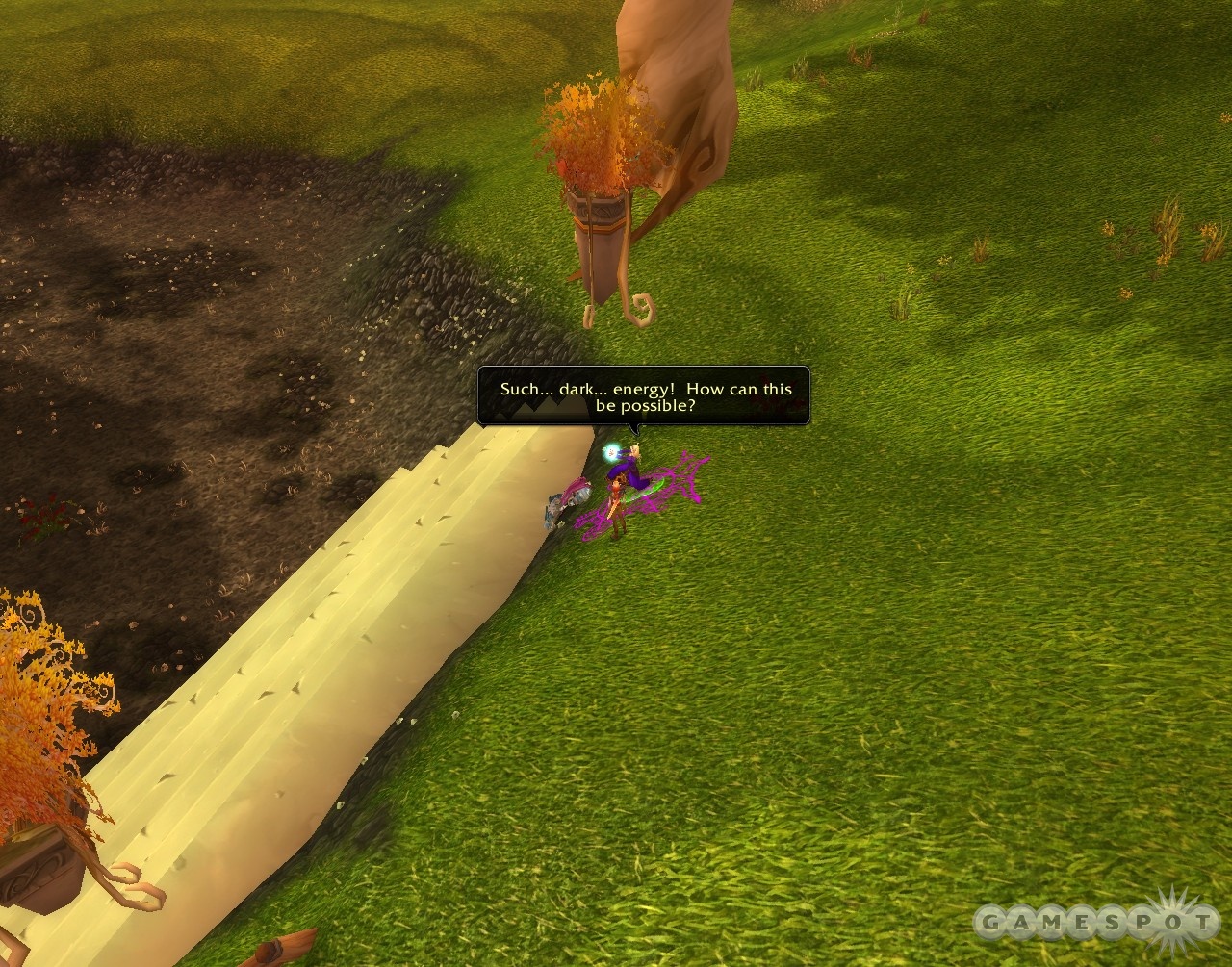
Silvermoon is a bit spread out for a capital city, to the point where some of the functions of the city, such as the bank and the auction house, are replicated on both the eastern and western sides. This is reportedly to prevent the accumulation of players around a single hotspot in the city, like the auction house/bank zones in Orgrimmar or Ironforge. Unfortunately, the end result is that the city requires a bit of walking around to get from the entrance to the bank and auction house areas; this is compounded by the fact that the flight path is located outside the city gates.
However, it's worth dealing with Silvermoon, since Eversong and the Ghostlands both form an excellent starting area for getting your character up near level 20. While Eversong requires a bit of walking around to get from quest to quest, the Ghostlands features numerous easy kill or collection quests near the town there, allowing you to grind out lots of XP relatively quickly.
If you want to join up with your friends in the Barrens, though, getting out of these areas is fairly easy. There is a teleporter located in Silvermoon, in the Inner Sanctum area of the Sunfury Spire. If you click on the Orb of Translocation there, you'll be instantly warped to the capital of the Forsaken, the Undercity. If there were no transporters like this, level 20 characters would have to fight their way through the Eastern Plaguelands, a level 60 area, to reach civilization.
Outland
Perhaps the biggest draw of the Burning Crusade is the inclusion of the Outland, a ruined portion of the world of Draenor, which was destroyed as Ner'zhul opened numerous portals on its surface to other worlds. This shattered remnant of a once-whole planet drifts through space, much diminished…but no less dangerous.
In between the events of World of Warcraft and the Burning Crusade expansion, the Dark Portal, which had sat inert in the Blasted Lands, has been opened and is capable of bringing souls between Azeroth and Outland once more. This time, however, its primary purpose isn't to bring forth Orcish hordes to Azeroth (although numerous demons and other nefarious sorts will definitely attempt to break through). Instead, it serves as a portal for players to leave Azeroth and find new adventures in the Outland.
The Basics: Entering Hellfire Peninsula
You need to be at least level 58 to travel through the Dark Portal. At that point, all you have to do is head to the Blasted Lands, in the southeastern part of the Eastern Kingdoms, and head south through the portal! The trip won't likely be easy, but the Blasted Lands zone is primarily for characters around level 50, so you shouldn't be in too much danger during the journey. You'll likely pick up a simple quest just before you pass through the portal, which will link you up with other questgivers on the other side of the rift. With that in hand, head through the portal and get ready for fun!
On the other side of the portal, avoid heading straight down the stairs and towards the battle that rages in front of you. It's fun to look at, for sure, but will probably be fatal to you if you attempt to intervene. Instead, you should look around for a flightmaster for your faction. If you're a member of the Alliance, then drop down to the left after exiting the portal to find a flightmaster who'll take you to Honor Hold. Horde members will want to jump down to the right, where you'll be taken to Thrallmar. These are the main questing hubs for each faction.
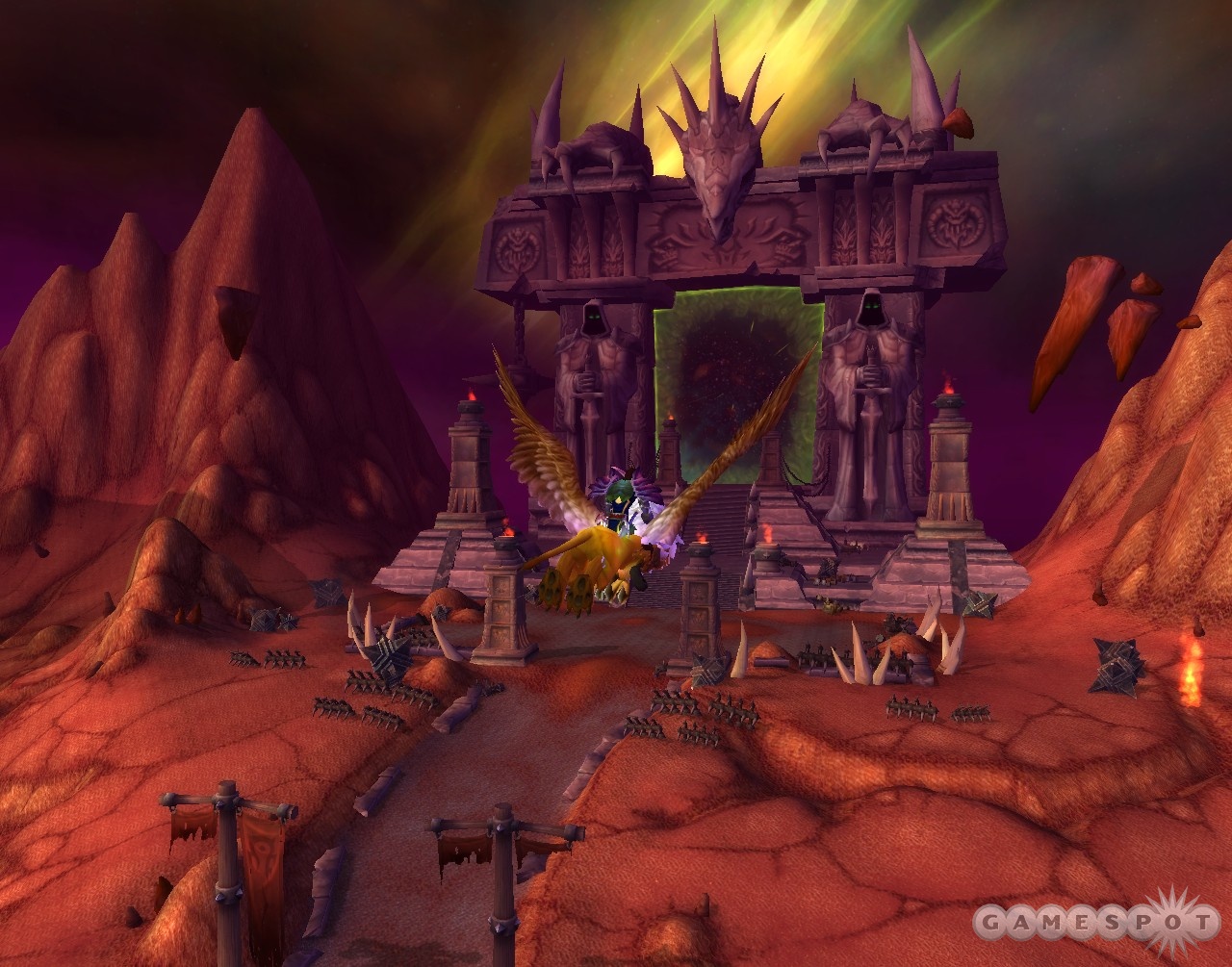
Note that we said main questing hubs. As you level up and explore a bit, each faction will be able to find three or four more flight path and questing hubs. It pays to be attentive when exploring, though, as you'll also run across plenty of opposing-faction hubs and flightpaths (as well as players, which are obviously going to be dangerous on PVP servers).
At this point, most of what you're going to be doing will be precisely what got you most of the way from level one to level 60: soloing or duoing quests that are scattered around the zone, trying to earn reputation with the various factions in Outland (some of the world PVP objectives will net you nice rewards from the factions that let you rep up with them), ganking n00bs on the other faction when they're taking on two mobs, and so on. If you want to start taking on dungeons, then feel free to try and get into a group for the Hellfire Ramparts instance, which is part of the Hellfire Citadel dungeon. The Hellfire Citadel, located near the center of the zone, will be a source of instanced action from level 60 to 70, as there are four different small wings full of Fel Orcs that will provide a nice challenge for players of various levels.
Outland-Specific Features
There are plenty of game features that are only available to players after they enter the Dark Portal and travel to Outland. Some of these features can tangentially become available to game players who don't have the Burning Crusade (items made with Jewelcrafting, for instance, can be bought or worn by players without the expansion installed, even if they won't be able to learn the tradeskill itself). This section of the game will detail some of these new features.
Flying Mounts
One of the most heralded addition to the Burning Crusade is the ability to purchase mounts capable of flight. These flying mounts can only be bought in Outland, when your character is level 70, and can only be used in Outland. (Flying mounts can still be ridden on the ground in Azeroth, but cannot fly there.)
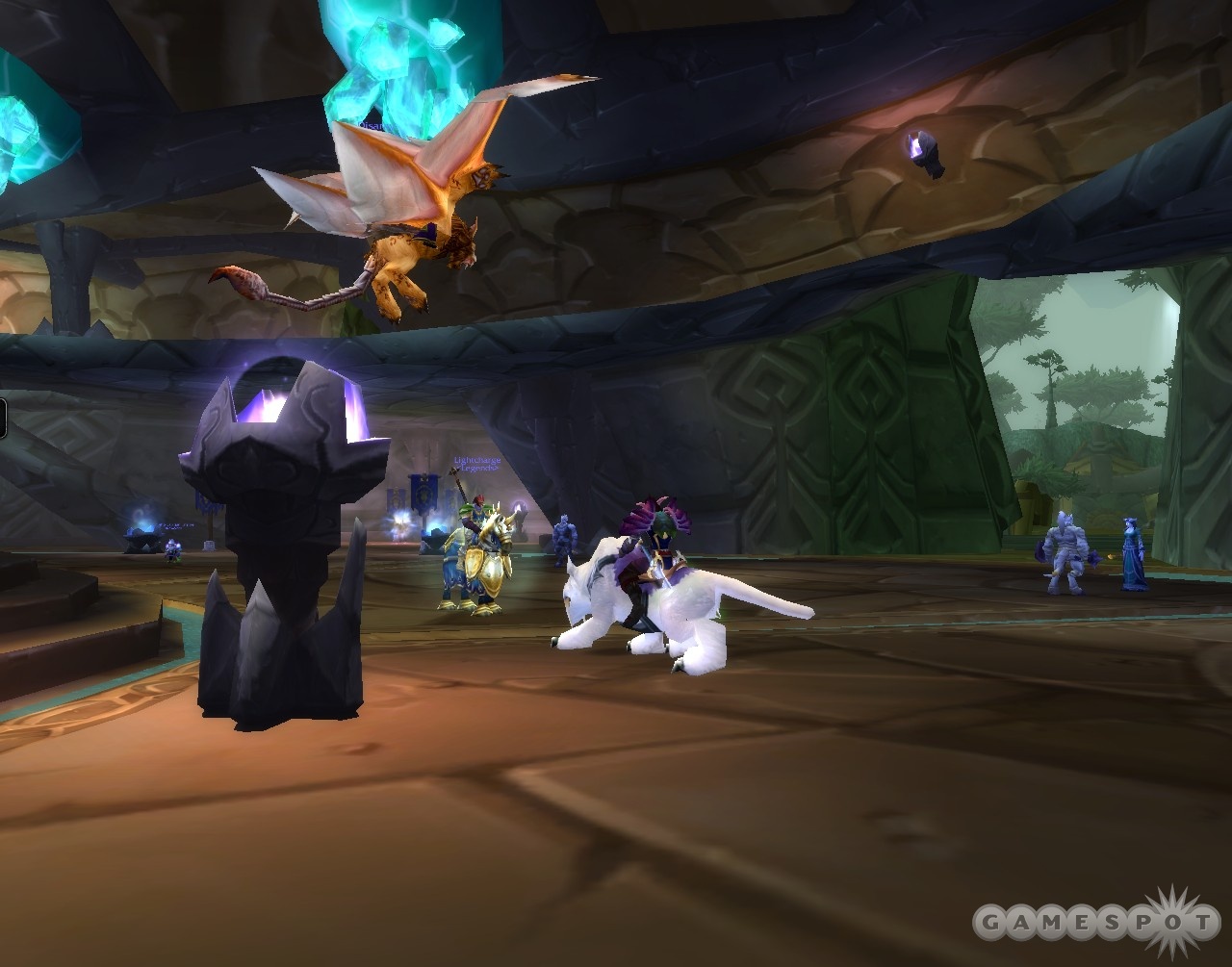
There are two types of flying mounts available to you: Expert and Artisan. Expert mounts will require (assuming there is no reputation discount) 900 gold to learn the expert riding skill, and 100 gold for the mount itself. These move at around the same speed as a normal mount (60% increase in movement), but can fly through the air. (You luck out if you're a druid, though, as you'll be able to learn the Flight Form spell at level 68 which enables you to shapeshift into a flying form that will act much like a normal flying mount.)
If you have some time to grind out an impressive amount of money, then you can bump yourself up to an Artisan mount. These are going to cost a massive 5000 gold for the training, and 200 gold for the mount itself. Artisan mounts are capable of moving at a 100% speed increase on the ground (the same movement increase as an epic land mount), and at a blistering 280% speed increase in the air.
Flying mounts are obviously neat on their faces; it's fun to be able to go right to your destination without having to worry about encountering monsters or PVP opponents on the way. What's more, though, is that there are some locations that are only accessible if you have a flying mounts, including some of the new end-game dungeons, as well as some high-level fishing areas. The flying-exclusive dungeons, at least, are inaccessibly to warlock summoning, so there's no cheating this requirement; you have to have a flying mount, or the druid flight form skill, to access them.
Socketed Items
If you played Diablo II, then you'll understand the concept of socketed items fairly instinctively. Many of the pieces of armor that you'll find in Outland will have sockets in them, into which you can insert jewels, which we talked about in the Jewelcrafting section of the guide.
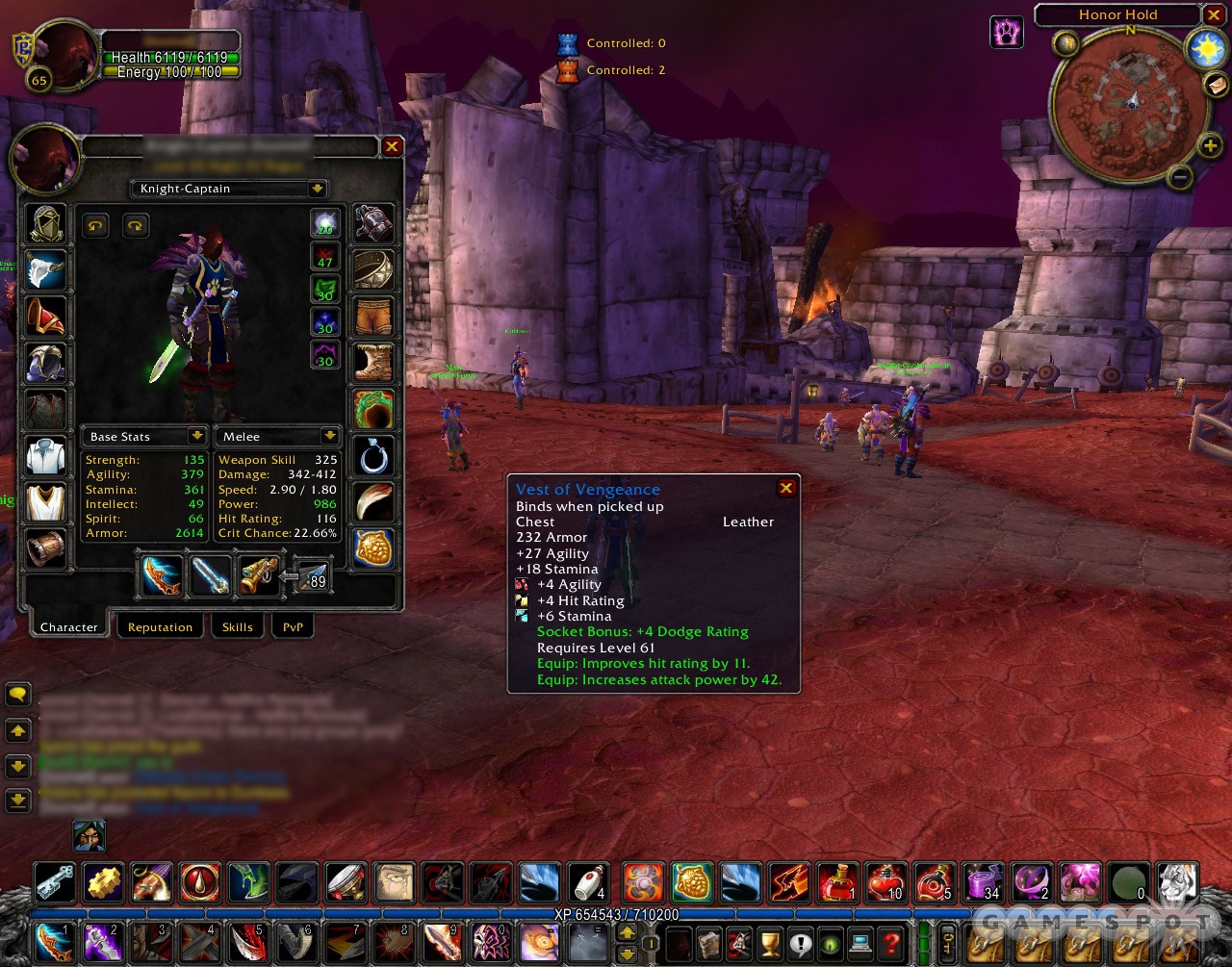
Unlike in Diablo II, though, every jewel you find is color-coded, as are all the sockets on items. You can put a jewel of any color into a socket of any color, so if you find a blue jewel and have an empty red socket, feel free to pop it in. However, most socketable items have a greyed-out stat boost. The only way to unlock and activate this stat boost is to ensure that all of the sockets on your item are paired up with jewels of the appropriate colors. If, theoretically, you found an item with three red sockets, then you'd need to find three red jewels to insert in those sockets to unlock the item's latent stat boost. You can, again, put any color jewels in these sockets, but if you use anything other than red jewels, you won't unlock the stat boost. For most items, though, these latent stat boosts are relatively minor, at least compared to the built-in stats and those you'll be netting from jewels.
Note that some jewels are multi-colored. If you find a jewel that counts as both red and yellow, it will be able to fit in a socket of either color and still count towards activating the hidden stat boost.
Also unlike in Diablo II, you can eliminate jewels from sockets after they're inserted, so you don't have to hold out for the perfect jewel for an item. If you fill up an item with jewels, then find another jewel that you'd like to put into it, go ahead and place it into a jewel slot. It'll destroy the jewel that was previously in the slot, so you won't be able to reuse or resell it, but you'll at least be able to upgrade your item with the new jewel.
In addition to jewels made through jewelcrafting (which we're going to guess are going to be relatively common on most servers), you can also find some powerful jewels on the boss monsters in some of the Outland dungeons. These are likely to be more powerful than anything that jewelcrafters will be able to create, and as such will no doubt make for some interesting loot discussions when your team gets a drop off of them.
Arenas
In addition to a single new PVP Battleground, the Outland also introduces the Arena PVP system, which allows for smaller groups of enemies to face off in single combat without having to worry about dealing with the objectives of Battlegrounds.
Both of the Arenas currently in the game are in the Outland, but there are battlemasters that can warp you to them from most major cities. You can't join a ranked Arena Team until you're level 70, but players of most levels will be able to join practice or pickup matches before you reach the level cap. You can play in Arenas in groups of two, three, or five players, facing off against an equal number of players from the opposite faction.
Fights in the Arenas have a number of specific rules intended to keep the fights relatively fair. To wit:
- The pre-match warmup session will reduce mana costs for all your spells to zero, allowing you to quickly buff all team members without worrying about mana. Warlocks can also cast any Soul Shard spells without using any Soul Shards.
- No player can resurrect when killed; when you die, you're dead.
- No consumable items save for bandages or conjured food/water can be used in the Arena. No potions!
- No spells or abilities with cooldowns of more than 15 minutes can be used. If you rely on Retaliation or Lay On Hands to survive fights, prepare to test your other skills for a while.
As such, when an Arena fight starts, it's a simple matter of killing everyone on the opposite team before they're capable of killing you. You don't get any points for effort here; your goal is to win.
While practice or pickup matches are played simply for the fun of the fight, when you reach level 70, you can form Arena Teams that can be ranked. The process is fairly simple on its surface: your rank goes up when your team wins match. You gain a lot of ranking from defeating teams that are more highly-ranked than you, while winning against lower-ranked teams will net you a lower amount of ranking prestige. Correspondingly, losing against higher-ranked teams won't affect your ranking as much as will losing against a team that's inferior to you.
New Talents and New Level Cap
One of the most obvious enhancements for players with the Burning Crusade is the ability to level up to level 70. The previous level cap in World of Warcraft was level 60. After you install the Burning Crusade, your level cap will increase automatically and you’ll be able to begin earning experience again.
Increasing your level to level 70 will result in a number of benefits; you’ll gain more talent points, will be able to use higher-level equipment, and will eventually be able to use flying mounts.
New Talents were introduced to the game in the patch that immediately preceded the Burning Crusade, allowing most talent trees to extend all the way up to a 41 point ubertalent. This completely changed the way that most class builds are formulated, so if you’re returning to the game after a bit of time off, you’re definitely going to have a period of adjustment to the new order. Alongside the new talent trees, some talents have been rearranged in power, so you’ll need to examine the new talent trees (especially the new talents at their bottoms) to see what’s right for you now.
Note that you don’t have to have the Burning Crusade installed to use these new talents. But getting to the bottom of a talent tree will take 41 points invested in that tree, which for a level 60 character will leave them only 10 points to invest elsewhere.
Got a news tip or want to contact us directly? Email news@gamespot.com
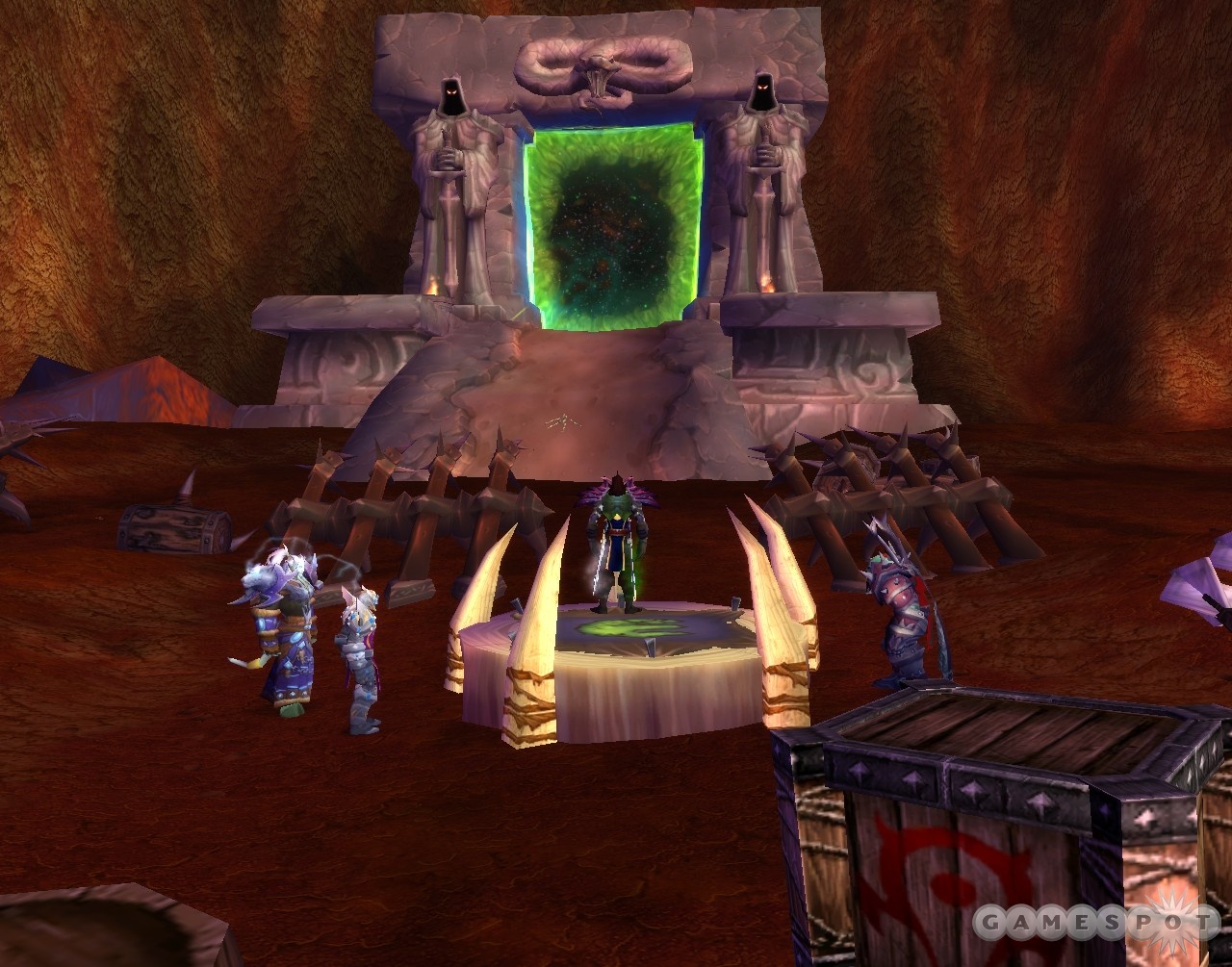
Join the conversation